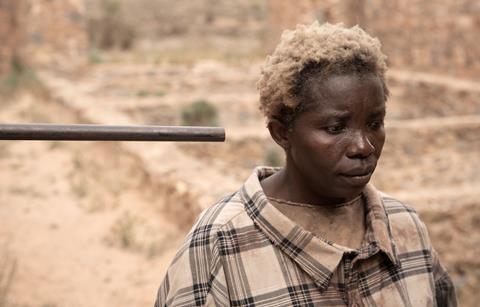An imprisoned woman fights for survival in Rolf de Heer’s stark Berlin Competition title

Dir/scr: Rolf de Heer. Australia. 2022. 96mins
Rolf de Heer’s wordless allegorical drama explores its themes in savage, boundless landscapes; in stark images of hate and violence; and in disease and blood. A far-reaching cross-country trek, the film starts in a barred metal crate, abandoned on the baked clay of an Australian desert. In this cage is BlackWoman (Mwajemi Hussein), shoeless, ragged and left to die. But she is resourceful and manages to break out of her prison, travelling far in search of safety. The backdrop is unmoored in time – it is not clear whether we are viewing an alternative present, a dystopian future or a symbolic construction. But this is clearly a film that is responding to a specific moment in history, weaving together the impact of the pandemic and the BLM movement. It’s striking, thought-provoking filmmaking, although it rather runs out of steam and ideas in the third act.
A world of white oppression, which is ruled by guns and blighted by a highly infectious and deadly disease
This is De Heer’s first feature film since Charlie’s Country (2013), which premiered in Cannes and secured the Un Certain Regard Best Actor prize for star David Gulpilil. It marks a return to Berlin Film Festival’s competition, a slot he last occupied in 2003 with Alexandra’s Project. This film’s distinctive approach and arrestingly cinematic impact should ensure a healthy festival run. While it should be of interest to arthouse distributors, the film is likely to be a theatrical curio rather than a breakout success.
One thing is certain: the picture’s opening is terrific. The camera pans across what appears to be a scale model of an atrocity of some kind, with tiny figures brandishing tinier firearms over their cowering victims. But as the camera pulls back, a knife slices into the diorama and it is revealed to be a cake: an execution camp rendered in sugar and marzipan, and placed on top of a thick layer of chocolate sponge. The burbling voices of the partygoers are muffled by the gas masks they wear. And outside, ignored by the guests, is BlackWoman in her cage on a trailer, attached to a vehicle that will haul her into the desert to endure the diurnal temperature plunges and the desiccated, dusty pink-beige light which colours everything, including the sky.
But BlackWoman manages to break free, and her subsequent journey takes her as far as the verdant mountains of Tasmania; along the way, she encounters many who would wish her dead, some who view her as a threat and two – BrownGirl (Deepthi Sharma) and BrownBoy (Darsan Sharma) – who go out of their way to help her. This quest, accompanied by a sparse, breathy score that sounds like the wind blowing over open graves, has a mythic quality throughout, a sense of removal even when she is confronted by scenes of unimaginable brutality.
With no dialogue to work with, non-actor Hussein (a social worker by profession) brings an expressive physicality to a role that starts as a desperate scrabble for survival and shoes, but takes on wisdom and weight as she bears witness to the horrors of the world. It’s a world of white oppression, which is ruled by guns and blighted by a highly infectious and deadly disease.
Yet these are threats from which BlackWoman seems curiously disengaged, for reasons which become clearer at the end of the film. It’s an ending that may prove divisive; its message can be read in several ways. The bleaker interpretation is that privilege will always prevail, and that white-on-black persecution and discrimination is inescapable. Optimists, meanwhile, may prefer to cling to the suggestion that, no matter what else, the spirit is free and endures.
Production company: Triptych Pictures, Vertigo Productions
International sales: Fandango Sales sales@fandango.it
Producers: Julie Byrne, Rolf de Heer
Cinematography: Maxx Corkindale
Production design: Maya Coombs
Editing: Isaac Coen Lindsay
Music: Anna Liebzeit
Main cast: Mwajemi Hussein, Deepthi Sharma, Darsan Sharma, Gary Waddell, Natasha Wanganeen















![[L-R]: Amanda Villavieja, Laia Casanovas, Yasmina Praderas](https://d1nslcd7m2225b.cloudfront.net/Pictures/274x183/6/4/1/1471641_pxl_20251224_103354743_618426_crop.jpg)








